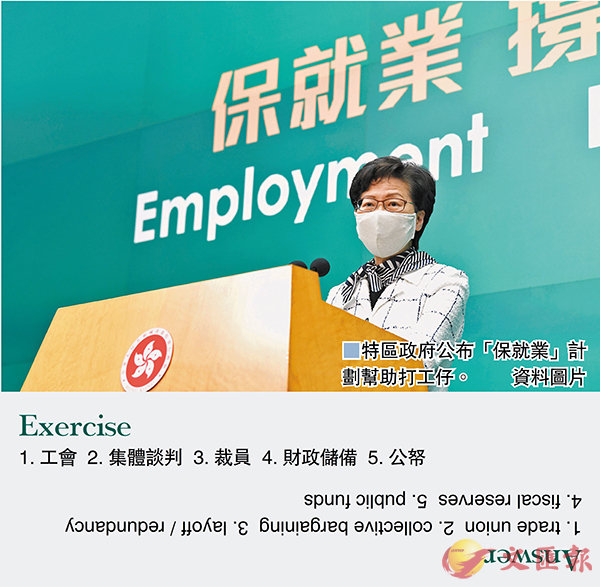
原文
特區政府公布「保就業」計劃首批已領取工資補貼的僱主名單。政府公布名單,希望借助社會力量,共同監察僱主,確保補貼完全落到打工仔手上。政府相關部門要調配人手和資源主動監察,僱員及工會更應積極協助,防止部分蠱惑僱主剋扣補貼自肥,對違規者必須嚴厲處罰,以儆效尤。同時政府有必要根據實施情況檢討完善計劃,確保僱主信守不裁員承諾,與僱員共度時艱。
受示威和疫情雙重夾擊,本港經濟直插低谷,政府為避免企業倒閉、出現大規模裁員潮,採取保企業、保就業相結合策略,大手筆動用財政儲備,推出800億元史無前例的「保就業」計劃,協助僱主渡過難關,亦保住打工仔飯碗。從昨日公布的領取僱主名單可見,遭疫情重創的旅遊、零售、航空、酒店業皆有公司申領,當中不乏為人熟知的大品牌、大企業,共涵蓋25,500名僱主,涉及48億元工資補貼,承諾受薪人數超過20萬個。
目前社會最關注的是,工資補貼能否百分百落到打工仔手上。雖然可以相信大多數僱主是良心僱主,按要求用足工資補貼、信守不裁員承諾。但也不排除有蠱惑僱主打政府工資補貼的主意,申請保就業計劃後,採用鑽空子的手法自肥,比如會在員工數目不變下,僱用較低薪的員工取代舊有員工,甚至先解僱原有員工再以較低薪重新聘用,以賺取差額。這樣做,顯然是濫用公帑、損害打工仔利益,令「保就業」計劃失去應有意義。有調查發現,有42.6%同意、35.2%受訪者非常同意保就業計劃存漏洞,不認為僱主會全數把津貼發還給僱員,近八成被訪者認為,「保就業」計劃的監管罰則不足。
政府發言人強調,每月的補貼必須全數用於支付僱員當月的工資;若僱主濫用或違反計劃條件,僱員或社會人士可向「保就業」計劃秘書處舉報,當局必定會積極跟進。但是,有工會人士指出,即使政府公布領取補貼的僱主名單,但基層員工未必有精神、體力及知識翻查資料;而且僱主僱員地位不對等,基層員工難以保障自己利益。因此,社會各界希望政府主動承擔監察責任,真正落實對違規僱主的處罰,防範僱主佔用補貼。政府既要對蠱惑僱主的陰招作出針對性的防範和懲罰,並動員僱員、工會加入監察行列,尤其要鼓勵僱員捍衛自己權益,主動舉報僱主的違規行為。
「保就業」計劃吸納各界意見,進行過優化,但仍需密切關注首批企業執行計劃的情況,及時發現問題和漏洞,繼續作出必要的完善修訂,進一步減少補貼被濫用的機會,確保第二期計劃更好發揮保就業的作用。
(摘錄自香港《文匯報》社評2020-6-23)
譯文
The SAR government published the list of the first batch of employers who have received wage subsidies under the Employment Support Scheme. By adopting a transparent approach, the government is aiming at a combined effort with the community to monitor employers and ensure that the wage subsidies go completely to employees. To prevent dishonest employers from abusing the subsidies, the government must set an example and punish severely those who are found to have violated the conditions of the scheme. Relevant government departments should make available ample manpower and resources for this purpose, and employees and trade unions should provide necessary assistance when needed. Meanwhile, the government should also regularly review and improve the scheme based on the feedbacks of its implementation, so as to ensure employers who applied for the scheme comply with its undertakings and weather the storm with their employees.
First hit by anti-government protests and then battered by the Covid-19 pandemic, the economy of Hong Kong has hit a deep trough. In order to save enterprises from the brink of collapse and avert the subsequent large-scale layoffs, the government has adopted a two-pronged strategy of supporting both enterprises and employment at the same time. With HK$80 billion drawn from the fiscal reserves, the government's unprecedented Employment Support Scheme could help employers to ride out the storm and let employees keep their jobs.
From the list of employers announced yesterday, enterprises in the tourism, retail, aviation, and hospitality industries, sectors that have been hit the hardest by the pandemic, have all applied for the government subsidies. Among them, many are well-known brands and big enterprises. The list covered close to 25,500 employers who receive a total wage subsidy of HK$4.8 billion with a combined committed headcount exceeding 200,000.
At present, what the society most concerned about is whether the wage subsidy will 100 per cent go to the employees or not. Although it is safe to say that most employers are trustworthy and will keep their words by spending all subsidies on employees and not making redundancies, there may still be dishonest employers out there who would abuse the wage subsidies and steal from their employees' pockets. For instance, some might work around the undertakings by keeping the number of employees unchanged, but replace existing employees with new and lower-paid ones. Some might even lay-off the same employees and then proceed to rehire them with lower salary offers. These actions are obvious misuses of public funds. Employers who do so are blatantly damaging the interests of employees, and would defeat the purpose of the scheme. A survey found that 42.6 per cent of the respondents agreed, and 35.2 per cent strongly agreed that there are loopholes in the Employment Support Scheme. They did not think that employers would fully spend the wage subsidies on their employees. Nearly 80 per cent of the respondents believed that there is not enough supervision from the government, and that the penalties for violators of the scheme are lacking.
The government spokesperson stressed that all wage subsidies received each month during the subsidy period must be fully spent on paying wages to their employees. The spokesperson also said that if an employer is found to have abused or violated the conditions of the scheme, employees concerned or members of the public may report to the Employment Support Scheme Secretariat who will proactively follow up on it. However, labour unionists have pointed out that even if the government has published the list of employers who have applied for the subsidies, workers of the lower levels might not have the time, vigour and knowledge to look at the published information. Moreover, the unionists raised a concern that the inequality between employees and employers would make it even harder for workers to protect their interests. Therefore, the society hopes that the government will take the responsibility to punish violators of the scheme, and prevent employers from abusing the subsidies. The government should take targeted precautions for fraudulent employers' tricks and punish them accordingly. The government should also mobilise employees and trade unions to monitor employers together. In particular, they should encourage employees to defend their rights and interests and report dishonest employers.
The Employment Support Scheme has absorbed opinions from the society and has been optimised, but it is still necessary to pay close attention to how the first batch of enterprises make use of the subsidies. Problems and loopholes must be found in time, and improvements must be made continuously to further reduce the chance of the subsidies being abused. Only then will the second phase of the scheme give full play to its role in supporting employment.
■Jeffrey Tse

